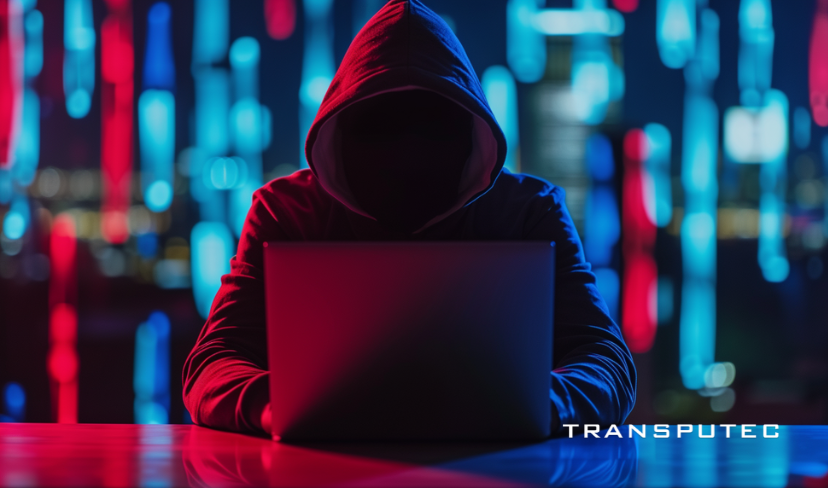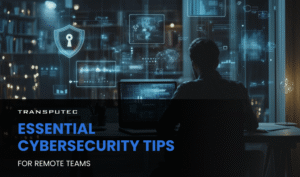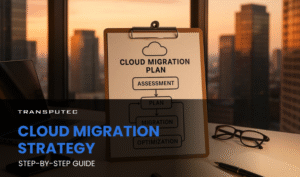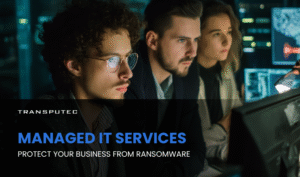Written by SONNY SEHGAL | CEO
The COVID-19 pandemic has reshaped the way we work, with remote work becoming the new normal for many organisations. While this shift has brought numerous benefits, such as increased flexibility and reduced overhead costs, it has also introduced new cybersecurity challenges. Cyber hygiene for remote workers has become a critical aspect of maintaining a secure and productive work environment. In this blog post, we’ll explore the importance of cyber hygiene, the risks associated with any remote worker, and the practical strategies to mitigate these risks.
What Is Cyber Hygiene and Why Does It Matter?
Transputec understands the critical importance of cyber hygiene and is committed to helping businesses implement robust security measures tailored to their unique needs.
Our team of cybersecurity experts can provide comprehensive assessments, customised solutions, and ongoing support to ensure your organisation maintains a strong cyber security posture.
What is Cyber Hygiene?
Cyber hygiene involves regular practices and measures to keep your systems clean and secure. These practices are similar to personal hygiene, like regular hand washing, but applied to digital security. They include updating software, using strong passwords, backing up data, and monitoring network activity. To have a proactive approach can reduces the risk of cyber attacks and data breaches.
Transputec helps businesses in enhancing their cyber hygiene through a comprehensive range of cybersecurity services, training and solutions.
The Importance of Cyber Hygiene for Remote Workers
Cyber hygiene refers to the practices and steps taken to maintain system health and improve online security. In the context of remote workers, cyber hygiene is crucial for protecting sensitive data, controlled access, preventing cyber attacks, and ensuring business continuity. With employees accessing corporate networks and handling confidential information from various locations, the attack surface for cybercriminals has expanded significantly.
According to a recent study by Verizon, the COVID-19 pandemic has led to a significant increase in cyber attacks, with a staggering 238% rise in global cyberattack volume. This alarming statistic highlights the need for organisations to prioritise cyber hygiene and implement robust security measures to safeguard their operations.
Risks Associated with Remote Workers Access
Remote work presents several cybersecurity risks that organisations must address proactively. Here are some of the most significant risks:
1. Unsecured Networks: Employees working from home may connect to unsecured or public Wi-Fi networks, increasing the risk of data interception and unauthorised access.
2. Lack of Physical Security: Unlike office environments, home setups often lack physical security measures, making it easier for unauthorised individuals to access sensitive information or devices.
3. Bring Your Device (BYOD): Employees may use personal devices for work purposes, which can introduce vulnerabilities if these devices are not properly secured and updated.
4. Phishing and Social Engineering Attacks: Remote workers are more susceptible to phishing and social engineering attacks, as cybercriminals exploit the increased reliance on digital communication channels.
5. Insider Threats: Remote workers environments can increase the risk of insider threats, as disgruntled or negligent employees may intentionally or unintentionally compromise sensitive data.
“Transputec's expertise in cybersecurity and commitment to client success make us an ideal partner in enhancing your cyber hygiene for remote workers. By leveraging our comprehensive solutions, continuous support, and employee training programs, you can ensure a secure and resilient remote worker environment."
Strategies for Enhancing Cyber Hygiene for Remote Workers
To mitigate the risks associated with remote work and maintain a robust cybersecurity posture, organisations should implement the following strategies:
1. Implement Multi-Factor Authentication (MFA)
Multi-factor authentication (MFA) adds an extra layer of security by requiring users to provide multiple forms of authentication, such as a password and a one-time code sent to their mobile device. MFA significantly reduces the risk of unauthorised access, even if login credentials are compromised.
2. Enforce Strong Password Policies
Encourage or mandate the use of strong, unique passwords for all accounts and implement password management tools to help employees create and store complex passwords securely.
3. Provide Secure Remote Access Solutions
Implement secure remote access solutions, such as virtual private networks (VPNs) or remote desktop protocols, to ensure that employees can access corporate resources securely from any location. Or consider a privileged access management and remote access solution like BeyondTrust.
4. Regularly Update Software and Systems
Ensure that all software, operating systems, and security solutions are kept up-to-date with the latest patches and updates. Outdated software and systems can introduce vulnerabilities that cybercriminals can exploit.
5. Implement Endpoint Protection and Encryption
Deploy endpoint protection solutions, such as antivirus software and firewalls, on all devices used for remote work. Additionally, implement data encryption to protect sensitive information in transit and at rest.
6. Conduct Cybersecurity Awareness Training
Educate employees on cybersecurity best practices, including recognising and reporting phishing attempts, using strong passwords, and maintaining physical security of devices and sensitive information.
7. Develop and Enforce Cybersecurity Policies
Establish clear cybersecurity policies and guidelines for remote work, covering topics such as acceptable use of devices, data handling procedures, and incident response protocols.
8. Regularly Monitor and Audit Security Measures
Continuously monitor and audit security measures to identify and address potential vulnerabilities or breaches promptly. Implement security information and event management (SIEM) solutions to centralise and analyse security logs.
Learn how to Maintain Robust Cyber Hygiene Practices with Transputec
Connect us today for our free consultation!
How Transputec helps secure your Remote Work Force
As remote work becomes the new norm, maintaining strong cyber hygiene is more critical than ever. Transputec plays a pivotal role in helping organisations enhance their cybersecurity measures and protect their remote work environments. Here’s how we support:
1. Comprehensive Cybersecurity Solutions
Transputec offers a suite of comprehensive cybersecurity solutions designed to address the unique challenges of remote work. Our services include:
- Network Security: We provide robust network security solutions to protect your home and office networks from unauthorised access and cyber threats.
- Endpoint Protection: Our endpoint protection services ensure all devices used for remote work are secure, preventing malware and other cyber attacks.
2. Security Assessments and Audits
We conduct thorough security assessments and audits to identify vulnerabilities in your remote work setup. Our experts evaluate your existing security measures and recommend improvements to enhance your overall cyber hygiene. This proactive approach helps mitigate risks before they can be exploited by cybercriminals.
3. Employee Training and Awareness
Transputec understands that human error is a significant factor in cybersecurity breaches. We offer tailored training programs to educate your employees on best practices for cyber hygiene. Our training covers:
- Phishing Awareness: Teaching employees how to recognise and avoid phishing attempts.
- Password Management: Guidelines for creating and managing strong, unique passwords.
- Data Protection: Best practices for handling and protecting sensitive information.
4. Advanced Threat Detection and Response
Our advanced threat detection and response services ensure that any potential security incidents are quickly identified and addressed. We use state-of-the-art technologies to monitor your systems in real-time, providing rapid response to mitigate threats and minimise impact.
5. Policy Development and Implementation
Transputec helps organisations develop and implement robust cyber hygiene policies tailored to their specific needs. We assist in creating guidelines and protocols that ensure consistent and effective cybersecurity practices across the entire workforce, whether they are in the office or working remotely.
6. Continuous Support and Consultation
Our commitment to your cybersecurity does not end with implementation. Transputec provides ongoing support and consultation to ensure your cyber hygiene practices remain effective and up-to-date. We stay abreast of the latest cyber threats and trends, updating our strategies and solutions accordingly to keep your remote work environment secure.
Conclusion
In the era of remote work and hybrid working, cyber protection has become a critical component of organisational success and business continuity. By implementing the strategies outlined in this blog post, organisations can significantly reduce their cybersecurity risks and protect their valuable assets.
Transputec plays a vital role in cyber hygiene for remote work by offering comprehensive cybersecurity services, including threat detection, vulnerability assessments, compliance audits, employee awareness training, and proactive threat management tailored for remote work scenarios.
Don’t leave your organisation vulnerable. Contact us today to schedule a consultation and learn how we can help you implement effective cyber hygiene measures tailored to your remote work needs.
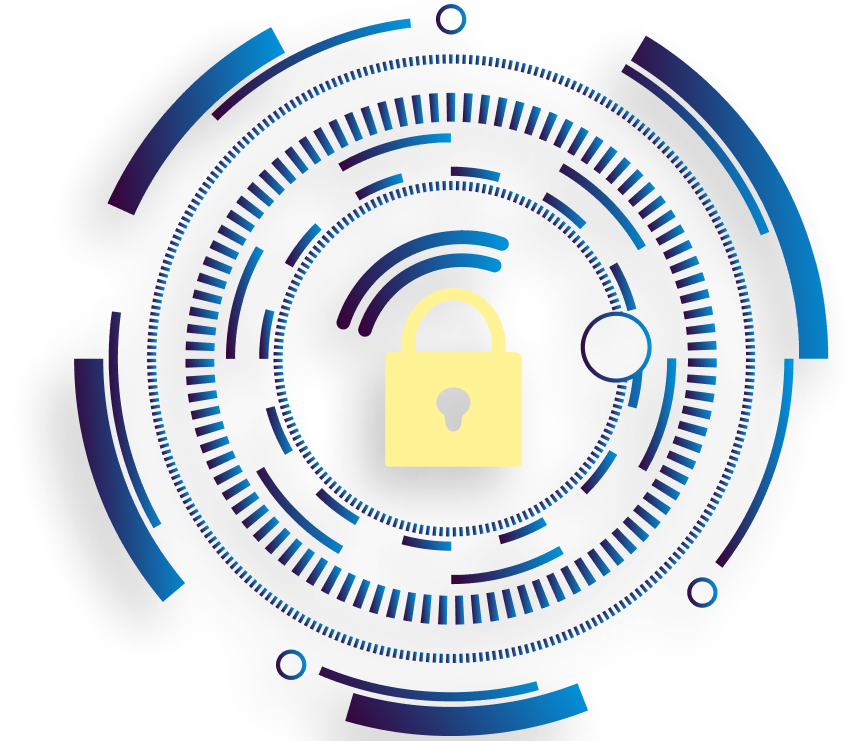
Secure Your Business!
Ready to protect your organisation from cyber threat?
Schedule a call with our team of experts at Transputec.
FAQs
What is cyber hygiene, and why is it important for remote work?
It refers to the practices and steps taken to maintain system health and improve online security. In the context of remote work, cyber hygiene is crucial for protecting sensitive data, preventing cyber attacks, and ensuring business continuity.
What are some common risks associated with remote work?
Common risks associated with remote work include unsecured networks, lack of physical security, use of personal devices (BYOD), increased susceptibility to phishing and social engineering attacks, and insider threats.
How can multi-factor authentication (MFA) enhance cybersecurity for remote workers?
MFA adds an extra layer of security by requiring users to provide multiple forms of authentication, such as a password and a one-time code sent to their mobile device. This significantly reduces the risk of unauthorised access, even if login credentials are compromised.
Why is it important to conduct cybersecurity awareness training for remote workers?
Cybersecurity awareness training educates employees on best practices, such as recognising and reporting phishing attempts, using strong passwords, and maintaining physical security of devices and sensitive information. This helps mitigate the human element of cybersecurity risks.
How can Transputec help organisations enhance their cyber hygiene for remote work?
Transputec’s team of cybersecurity experts can help organisations implement effective cyber hygiene measures tailored to their remote work needs. This includes implementing secure remote access solutions, enforcing strong password policies, providing cybersecurity awareness training, and continuously monitoring and auditing security measures.
